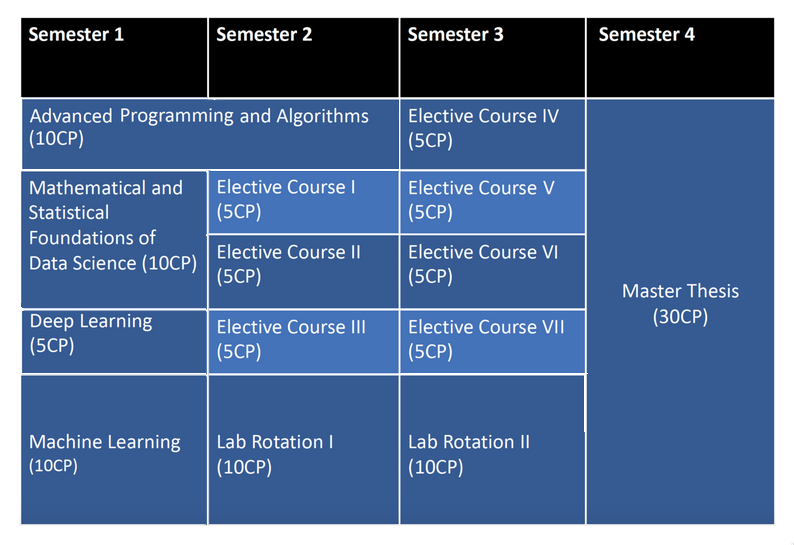Programme

- Duration: 2 years
- European credit points (CP) in total: 120
- Starting Date: Oct 2022
Structure of the Programme
8 courses that every student in the program takes:
- Advanced Programming and Algorithms (10 CP)
- Deep Learning (5 CP)
- Machine Learning (10 CP)
- Mathematical and Statistical Foundations of Data Science (10 CP)
- Lab rotation I (10 CP)
- Lab rotation II (10 CP)
- Master Thesis (26 CP)
- Master Thesis Seminar (4 CP)
7 elective courses, e.g. the following
- Methods of Artificial Intelligence in Life Sciences
- Deep Learning in Life Science: Representation Learning (5 CP)
- Deep Learning in Life Science: Generative Models (5 CP)
- Generative Models and Sampling Methods (5 CP)
- Algorithmic Game Theory (10 CP)
- Causality (5 CP)
- Computational Linguistics (5 CP)
- Relational Databases and Data Analysis (5 CP)
- Data & Knowledge Engineering (DKE) (5 CP)
- Markov Chains (5 CP)
- Neuroimaging and Precision Medicine (5 CP)
- Philosophy of Intelligence (5 CP)
- Statistical Data Analysis (5 CP)
- Statistical Learning (5 CP)
- Introduction to Logic Programming (5 CP)
- Master Seminar Advances in Data Science (5 CP)
- Natural Language Processing (5 CP)
- Numerical Methods for Data Science (5 CP)
- Introduction to Linear Optimization (5 CP)
- Reinforcement Learning (5 CP)
- Spoken Dialogue Systems (5 CP)
- Topological Data Analysis (5 CP)
- Information Theory (5 CP)
- Spectral Graph Theory and Graph Signal Processing (5 CP)
- Seminar Advanced Mathematical and Numerical Methods in Data Science (5 CP)
- Advanced Topics in Bayesian Data Science
- Master-Seminar: Telomere-to-telomere Journal Club
- Algorithms for sequence analysis
- Methods for population genetics
A more up-to-date yet still incomplete list of upcoming elective courses may be found here.
2 x 6 weeks hands-on work at research groups of your choice:
The program includes two Lab Rotations (6 weeks each) where students carry out practical work at Research Groups inside or outside HHU or in R&D environments at companies. The 6 weeks workload (10 ECTS) for a Lab Rotation need not to be taken in one block. The time a student need to be physically present at the Lab can be negotiated with the supervisor. Lab Rotations are offered by all lecturers that give courses within the Master’s Program and selected groups at the Jülich Research Center (e.g. the Jülich Supercomputing Centre). Students must get in contact with Research Groups or R&D departments well ahead before the Lab Rotation starts. The supervisors of the Lab Rotation select among applicants based on their suitability for the project.
NOTE: The two Lab Rotations at HHU must be carried out in different research groups that are associated with different faculties (e.g. MatNat and Medicine). Outside HHU the two Lab Rotations can be combined to a 3 month internship.
There is an overview page to get more information on Lab Rotations.
Students can apply to any research group that offers data science projects for a Master Thesis (~ 6 Months).
Ideally, the thesis should be carried out in one of the two groups where a Lab Rotations has been completed. Students are co-supervised by a member of the chosen research group and a lecturer of the Master's Programme.
There is an overview page to get more information on the Master thesis.

Focus Areas
It is recommended that students choose courses that are related with respect to their content. Possible focus areas listed below.
A specialisation at the early stage of a Master’s can be of advantage when applying for jobs, Grad Schools, and PhD programs that have similar focus.
1) Natural Language Processing
- Spoken Dialogue Systems
- Natural Language Processing
- Computational Linguistics
2) AI Methods
- Generative Models and Sampling Methods
- Causality
- Reinforcement Learning
- Algorithmic Game Theory
- Data & Knowledge Engineering
- Introduction to Logic Programming
3) Life Sciences
- Algorithms for Sequence Analysis
- Methods of Artificial Intelligence in Life Sciences
- Neuroimaging and Precision Medicine
- Deep Learning in Life Science: Generative Models
- Deep Learning in Life Science: Representation Learning
- Methods for population genetics
4) Mathematics & Statistics
- Introduction to Linear Optimization
- Markov Chains
- Statistical Learning
- Numerical Methods for Data Science
- Statistical Data Analysis
- Topological Data Analysis
- Information Theory
- Spectral Graph Theory and Graph Signal Processing
- Seminar Advanced Mathematical and Numerical Methods in Data Science

